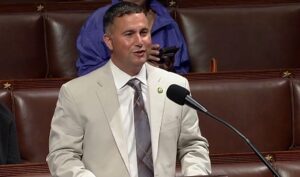The House of Representatives passed S. 1648, the Senate version of Central Florida Congressman Darren Soto’s Launch Communications Act.
The Launch Communications Act requires the Federal Communications Commission (FCC) to facilitate access to specified broadband spectrum frequencies for commercial space launches and reentries.
 “In Central Florida, the busiest spaceport in the world is right in our backyard at Cape Canaveral. Last year, we hit a record with 72 orbital missions, and over 100 are expected this year,” said Rep. Darren Soto, a Democrat. “We’ve often seen these launches stack up due to bad weather or other factors. This is why having a lengthy FCC license process for each launch can be cumbersome and costly. I’m proud of our efforts to streamline the process and ensure our spaceports remain the most efficient in the world.”
“In Central Florida, the busiest spaceport in the world is right in our backyard at Cape Canaveral. Last year, we hit a record with 72 orbital missions, and over 100 are expected this year,” said Rep. Darren Soto, a Democrat. “We’ve often seen these launches stack up due to bad weather or other factors. This is why having a lengthy FCC license process for each launch can be cumbersome and costly. I’m proud of our efforts to streamline the process and ensure our spaceports remain the most efficient in the world.”
Currently, all commercial missions launching from U.S. soil to space utilize a government-owned spectrum to communicate with the rockets during the 10 minutes it takes to get to orbit.
Ahead of a launch, private companies must apply to the FCC to receive special temporary authority (STA) to use this spectrum. In a tedious and inefficient process, the FCC coordinates each separate STA license with multiple federal agencies that could conceivably use the spectrum simultaneously.
This process has become highly burdensome to the government and commercial users applying for this spectrum.
The Launch Communications Act streamlines the bureaucratic elements of the rocket launching process, making it easier for private companies to obtain authorization and temporary use of the necessary spectrums.
The bill now heads to Democratic President Joe Biden’s desk to be signed into law.
RELATED: Republican Florida Senators Marco Rubio and Rick Scott sent a letter to FAA Administrator Michael Whitaker requesting clarity on the current approach to issuing launch and reentry licenses.


